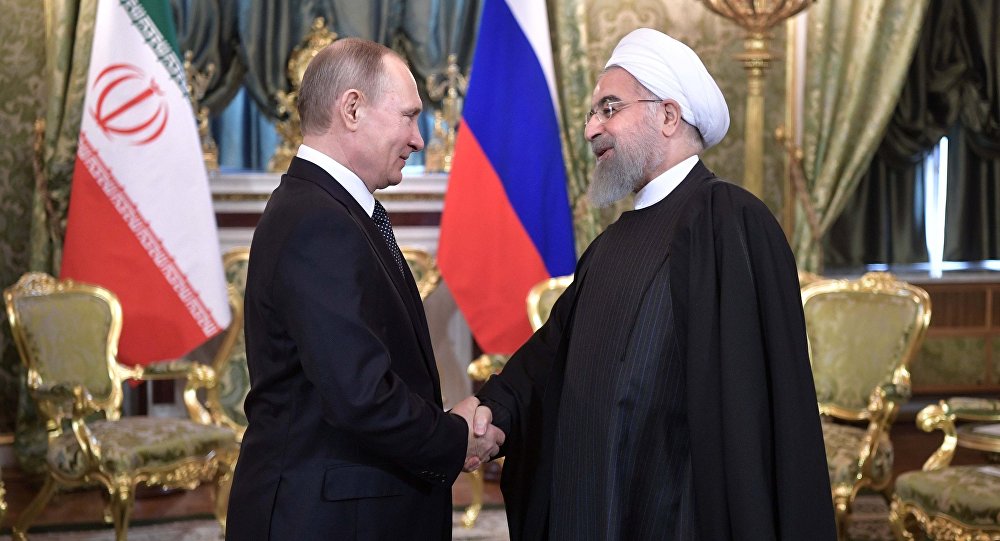
The Russian and Iranian presidents met Tuesday to discuss security in the Middle East, energy pacts globally and cooperation across various spheres between the two regional powers.
MOSCOW (Sputnik) — Iranian President Hassan Rouhani arrived in Moscow on Monday for talks with Russian President Vladimir Putin, in his latest foreign trip before the May presidential election.
The Tuesday summit saw the leaders discuss projects in areas such as energy, infrastructure and technology and the signing of several cooperation memorandums, as well as a deal on visa-free group travel.
SYRIA & END OF TERRORISM
Speaking at a joint press briefing, Rouhani linked lasting peace and stability in the Middle East to the eventual defeat of terrorism and vowed to build on the "good experience" that Iran shared with Russia in this regard.
Rouhani commented on the deteriorating security in Central Asia’s Afghanistan, which faced "terrorist threats from extremist forces." He said Iran and Russia had agreed to continue strengthening a democratic Afghanistan to help it on the way toward becoming free and prosperous.
Turning to Syria, the leaders reiterated in a joint statement that a peaceful solution was the only way of ending the six-year Syrian conflict and reaffirmed their support for a political and diplomatic approach based on the UN Security Council’s Resolution 2254.
Putin praised cooperation between the two allies that was instrumental to reaching a cessation of hostilities pact for Syria, also mediated by Turkey, while his Iranian counterpart said peace talks in Kazakhstan’s Astana would continue until all people in Syria have their rights fulfilled.
"Our ultimate goal is to strengthen peace and stability in the region. The development of our relations is not directed against third countries," Rouhani emphasized.
ENERGY & COOPERATION
On energy, the presidents said their nations were remained adamant about the need to preserve last year’s pact between the Organization of the Petroleum Exporting Countries (OPEC) and non-OPEC oil producers that sought to curb oil production to shore up falling prices and stabilize the global market.
Putin said Moscow sees a good potential for expanding cooperation with Iran in the oil and gas sectors. He cited a series of deals to develop large hydrocarbon fields in Iran and the arrangement to coordinate their efforts within the framework of the Gas Exporting Countries Forum (GECF) as some of recent successes.
After the summit, Russia's energy giant Gazprom and National Iranian Oil Company (NIOC) signed a memorandum on cooperation in the natural gas sector. Memorandums were also signed on electricity trade, transport of nuclear materials and the creation of a joint plant in Iran to assembly Russian Ansat or Ka-226T helicopters.
NUCLEAR PEACE
In an ambitious move, Russia and Iran committed to turning the Middle East into a region free of nuclear weapons.
The two presidents described the Treaty on the Non-Proliferation of Nuclear Weapons as the cornerstone of non-proliferation of nuclear arms, which they would build on to advance nuclear disarmament goals and promote the use of nuclear energy for peaceful purposes.
They also called on the United Nations to draft a rule book on how states should behave in the cybersphere after a crippling Stuxnet virus attack on Iranian nuclear assets seven years ago.
Former US Joint Chiefs of Staff Vice Chairman Gen. James Cartwright pleaded guilty last year to lying during a 2012 federal inquiry into the leak that exposed the computer worm. Washington is suspected of having masterminded the cyberattack on Iran alongside Israel.
